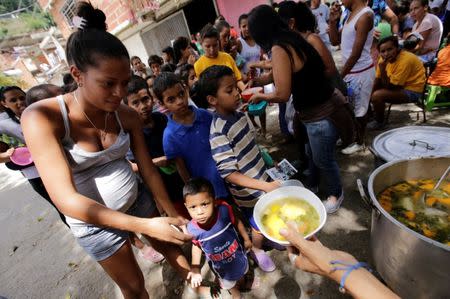Peru brings up Venezuela crisis at U.N., Venezuela swipes back
By Hugh Bronstein UNITED NATIONS (Reuters) - Peru's president Pedro Pablo Kuczynski told the United Nations General Assembly on Tuesday he is concerned about what he called the critical economic situation in Venezuela, citing shortfalls of food and medicine, while Venezuela accused him of meddling. It was the latest in a series of diplomatic blows to the OPEC-member country as it suffers through a major economic crisis with food supplies depleted and triple-digit inflation. "It is unavoidable that I mention our concern for the very critical political, economic and social situation that our friendly nation of Venezuela is experiencing," Kuczynski said in an official address to the annual gathering of world leaders. Venezuela's representative to the United Nations, Rafael Ramirez, called Kuczynski's comments "a gratuitous attack." "It was an unfortunate speech that shows that certain countries continue to interfere in our internal affairs," Ramirez said. Venezuela's opposition failed to draw large numbers on Friday in its latest protests against President Nicolas Maduro, and the national election board delayed a decision on the next stage of a possible referendum on his socialist rule. The opposition, which wants to unseat Maduro this year through a recall referendum, said his administration has cracked down on dissent by rounding up protesters and jailing high-profile figures, including opposition leader Leopoldo Lopez. "Full-fledged democracy requires absolute respect of human rights and fundamental freedoms, as well as due process," Kuczynski said. "It also requires the full guarantee of the respect of the separation of powers and checks and balances." Kuczynski, 77, is the political opposite of former bus driver and union organizer Maduro. The Peruvian leader spent years working for investment funds on Wall Street, even acquiring U.S. citizenship that he renounced before he ran for president. Only a handful of leaders traveled to Venezuela for a meeting last week of the Non-Aligned Movement, a Cold War-era bloc, in an embarrassment for the socialist government. Venezuela last week decried a decision that could force its suspension from the Mercosur trade bloc. Venezuela has been at the center of a fight over the rotating presidency of Mercosur and has lost its weight in the once staunchly leftist bloc as regional heavyweights Brazil and Argentina shift to the right. Ramirez said Venezuela was not isolated, that criticism against it was politically motivated and that the government was not contemplating any changes to its economic model. "We cannot give into blackmail from any country," he said. "It's unfortunate that Mercosur is being politicized," Ramirez added. Kuczynski came to power this year along with fellow free-market advocates Mauricio Macri in Argentina and Michel Temer in Brazil, marking a regional sea-change toward the right. In the past week, Kuczynski has discussed trade with Chinese President Xi Jinping in Beijing and infrastructure financing in New York with Larry Fink, the chief executive of the world’s largest asset manager, BlackRock Inc. The son of European parents, Kuczynski spent part of his childhood in the Peruvian Amazon where his father, a doctor, ran a leper colony. He speaks French, Spanish, English and German and has sat on the boards of several global companies. (Reporting by Hugh Bronstein; editing by Howard Goller, Grant McCool and Bill Rigby)


